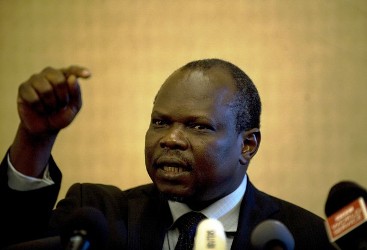SPLM Political Bureau backs oil stoppage and new pipeline
February 7, 2012 (JUBA) — The highest decision making body of South Sudan’s ruling party on Tuesday said that it backed the decision to stop oil production and to build a new pipeline through East Africa, as a dispute of transit fees continues.

Amum was speaking in Juba at a press briefing held at the headquarters of the SPLM’s national secretariat.
He said the meeting was convened by the leadership of the ruling party after the independence of South to listen to a report by its chairman, South Sudan’s President, Salva Kiir Mayardit.
Amum said the report covered the political, economic and the security situation in South Sudan, which seceded from the north in July last year.
Kiir briefed the meeting on the oil crisis and the other post-independence issues under negotiation, which include: international debt, assets, citizenship and border demarcation.
South Sudan stopped its oil production after North Sudan began confiscating crude as payment for transit fees it claims it was not receiving. Juba says it was paying for its oil to be exported using northern infrastructure and says it wants to pay around $1 per barrel, while Khartoum is asking for $32.
As well as reporting to the senior SPLM officials on the status of the African Union led negotiations in Addis Ababa, Amum presented a report from the deputy secretary general on the re-organisation and re-structuring of the party.
“The meeting endorsed decision of the council of ministers to shut down production of the oil and regard the decision as responsible exercise of sovereignty aimed at protecting the natural resources of the people of South Sudan”, Amum told the press.
He said the meeting also endorsed a recommendation calling for the adoption and implementation of austerity measures to ensure proper utilisation of the limited resources available through fiscal discipline, prioritisation and efficient delivery of services to the people of South Sudan.
The meeting further recommended exploring plans to build an alternative pipeline through Kenya and/or Ethiopia and Djibouti to export Nile Crude to international markets and reduce the dependency on the he Red Sea’s Port Sudan.
Khartoum’s demands for $32.02 per barrel were groundless and “not fair:, he said. “It is not justice and we will not accept it”, Amum said.
The senior member of the former rebel movement turned ruling party said it was time the Sudanese government realised that South Sudan is an independent nation with rights over its resources.
However, he denied President Bashir’s claim that South Sudan wanted to see the northern economy collapse in order to affect the stability of the government.
“We are ready to negotiate with Khartoum in a good faith and assist if they are honest and honor agreements on the pending issues of notable of which include Abyei and the border as per Comprehensive Peace Agreement”, he said.
Both countries will suffer from the oil stoppage with 98% of South Sudan’s budget coming from oil revenues. Khartoum also needs the fees from transporting South Sudan’s oil to boost its depleted hard currency reserves.
When South Sudan seceded it took with it 75% of Sudan’s oil output. The last six months have seen small scale protests against rising food prices in North Sudan.
In a public statement broadcasted live on Sudanese television last week, President Al Bashir said his country needs peace but “we will go to war if we are forced to go to war”.
He also warned his council of ministers of the possibility of returning to war with the new nation and accused Juba of shutting down the oil production with intention to provoke a “collapse” of the Sudanese government. He said blamed his southern counterpart Salva Kiir for refusing to signing an oil deal when they met in Ethiopia last week.
“They (the South) didn’t sign and they will not sign,” Bashir said.
At the time when production ended South Sudan’s production was around 350,000 barrel of crude oil per day.
On Monday Kiir blamed Bashir for the impasse and the economic problems facing the north.
“The current political situation in the north cannot be blamed on anybody. It is their making. They have actually failed to address their internal affairs”, Kiir told officers at the briefing on Monday.
Majak D’ Agoot, the South Sudan’s deputy minister of defense, also dismissed reports alleging that his country was working “underground” to topple the Sudanese government led by the National Congress Party.
He said South Sudan had not become independent in order to create “enmity” with their neighbours, including Sudan, but that they went to war in order to bring peace and stability in the region.
Agoot, a one of the influential former rebels turned politician within the ruling SPLM, says his country was facing challenges some of which were by-products of Khartoum’s action against the South but they are being contained.
“We are also having our challenges. Some of them are actually those sponsored by Khartoum but we are managing them,” Agoot said.
South Sudan accuses Khartoum of sponsoring militia and rebellions in South Sudan to destabilise the nation with a mind to retake control of the oil fields.
Khartoum denies the charge and instead counters that South Sudan provides logistical and military support to rebels in Darfur, Blue Nile and South Kordofan.
(ST)
